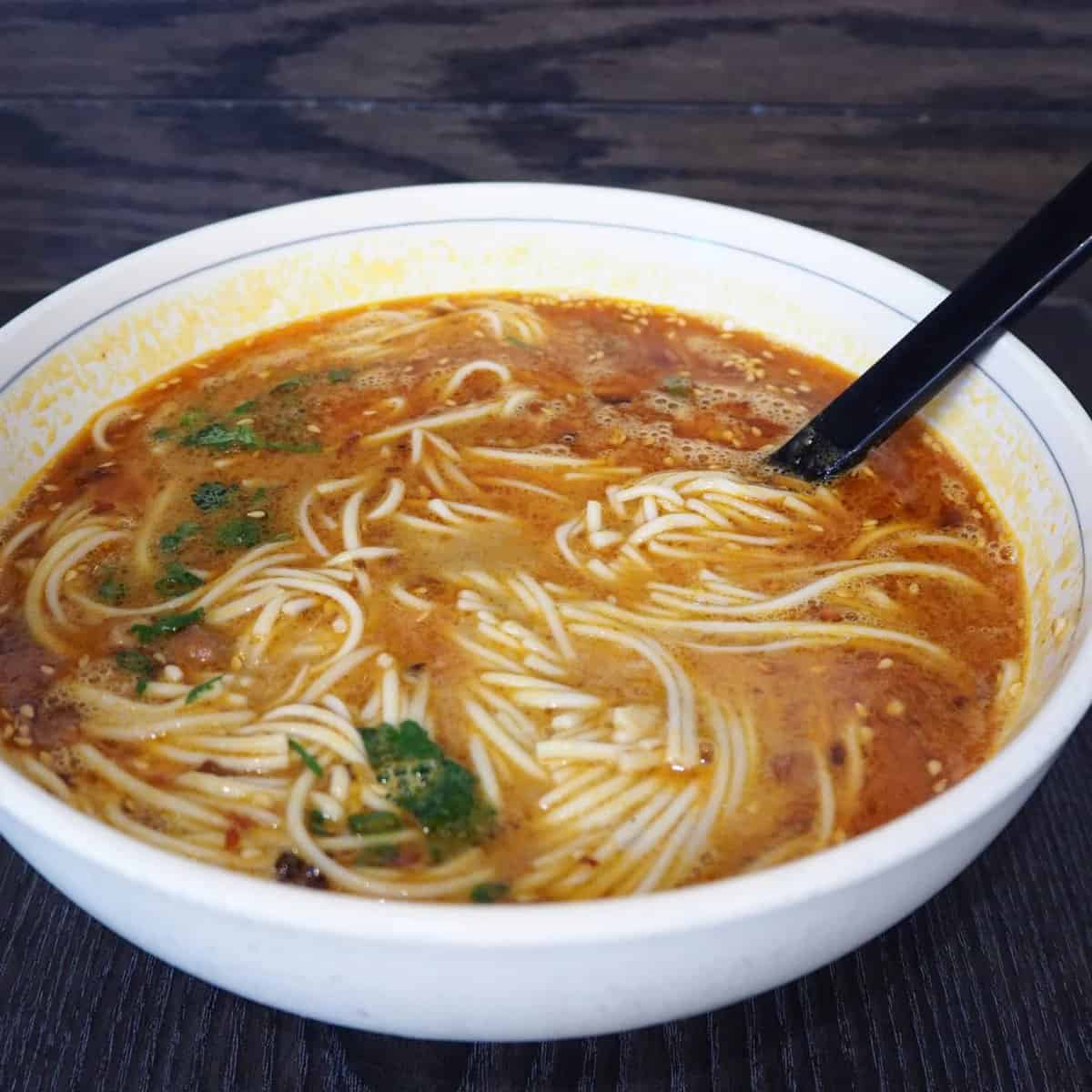Dan Dan Noodles or “Dandanmian”: Origin, Ingredients, and Noodle Types
Dandan noodles or dandanmian (traditional Chinese: 擔擔麵, simplified Chinese: 担担面) is a noodle dish originating from Chinese Sichuan cuisine. It consists of a spicy sauce containing preserved vegetables (often including zha cai (榨菜), lower enlarged mustard stems, or ya cai (芽菜), upper mustard stems), chili oil, Sichuan pepper, minced pork, and scallions served over noodles. Sesame paste and/or peanut butter is sometimes added, and occasionally replaces the spicy sauce, usually in the Taiwanese and American Chinese style of the dish. In this case, dandanmian is considered as a variation of ma jiang mian (麻醬麵), sesame sauce noodles. In American Chinese cuisine, dandanmian is often sweeter, less spicy, and less soupy than its Sichuan counterpart.
But what is it exactly? And how did it get its name? Let’s take a look at the history of this dish.


Check out our new cookbook
Bitemybun's family recipes with complete meal planner and recipe guide.
Try it out for free with Kindle Unlimited:
Read for freeIn this post we'll cover:
What Makes Dan Dan Noodles So Addictive?
Dan Dan Noodles are a traditional Chinese dish that consists of thin, boiled noodles topped with a spicy sauce and ground pork. The dish is named after the carrying pole (dan dan) that street vendors used to carry the noodles and sauce.
The Sauce
The sauce is the star of the dish and can be made with a variety of ingredients. The most popular version is a spicy, red sauce made with chili oil, Sichuan peppercorns, soy sauce, sugar, and vinegar. Some recipes also add miso or sesame paste for a richer flavor. The sauce can be adjusted to be as hot or sweet as you like.
The Meat
Ground pork is the traditional meat used in Dan Dan Noodles, but some chefs use other meats like chicken or beef. The meat is cooked with soy sauce and other seasonings before being added to the sauce.
The Vegetables
Dan Dan Noodles can be served with a variety of vegetables, but the most common are bok choy, bean sprouts, and scallions. These vegetables add a fresh and crunchy texture to the dish.
The Noodles
The type of noodles used in Dan Dan Noodles depends on personal preference. Some people prefer a thicker noodle, while others like a thinner noodle. The noodles are usually boiled until they are al dente and then mixed with the sauce.
The Toppings
In addition to the ground pork and vegetables, Dan Dan Noodles can be topped with a variety of ingredients. Some popular toppings include a soft-boiled egg, chopped peanuts, and cilantro.
The History
Dan Dan Noodles have a long and complex history. The dish is said to have originated in Sichuan province in China and was carried by street vendors on a pole (dan dan). Over time, the dish has become one of the most popular and famous dishes in China.
The Final Verdict
Dan Dan Noodles are definitely not a tough dish to make, but they can be complex in terms of flavor. The battle between sweet and spicy is what makes this dish so loved by locals and tourists alike. If you’re able to find a good recipe and the right ingredients, you’ll be able to make an ultra-delicious bowl of Dan Dan Noodles that will leave you wanting more.
The Spicy History of Dan Dan Noodles
Dan Dan Noodles is a popular Chinese dish that originated from Sichuan province, known for its spicy cuisine. The dish is named after the carrying pole (dan dan) that street vendors used to carry the noodles and the sauce to sell on the streets.
Name
The name “Dan Dan” comes from the street vendors who used to carry the noodles and the sauce on a pole over their shoulders. The pole was called “dan dan,” and the vendors would yell “dan dan” to attract customers. Over time, the dish became known as “Dan Dan Noodles.”
Spicy Sauce
The spicy sauce is the key ingredient that gives Dan Dan Noodles their signature flavor. The sauce is made with a combination of chili oil, Sichuan peppercorns, soy sauce, and other spices. The sauce is typically quite spicy, but the level of spiciness can be adjusted to taste.
The Key Ingredients That Make Dan Dan Noodles So Delicious
To add an extra umami boost to the dish, some recipes call for the addition of tahini or a blend of pastes, such as miso and gochujang. These ingredients add depth of flavor and balance out the spiciness of the dish.
Choosing the Right Noodles for Your Dan Dan Noodles Dish
No matter what type of noodle you choose, it’s important to prepare them properly for your Dan Dan Noodles dish. Here’s how:
- Cook the noodles according to the package instructions until they are fully cooked.
- Drain the noodles and rinse them under cold water to stop the cooking process.
- Toss the noodles with a little bit of sesame oil to keep them from sticking together.
Prepare for the Future: Make Dan Dan Noodles in Advance and in Bulk
- Dan Dan Noodles are a famous Chinese dish that uses a unique spicy sauce made with ground pork and a list of carefully selected ingredients.
- The key to making this dish is the sauce, which takes time to prepare and cook.
- If you’re looking to save time and effort, making the sauce in advance is a perfect solution.
- You can prepare a large batch of the sauce and store it in small containers, making it easier to use whenever you want to make Dan Dan Noodles.
- The sauce can be stored in the refrigerator for a couple of days or frozen for a longer period.
Conclusion
Dan Dan Noodles are a Chinese dish that’s become popular worldwide. They’re made with thin noodles and a spicy sauce, and they’re named after the street vendors who carried them on a pole called dan dan.
You can’t go wrong with a recipe like this.
Check out our new cookbook
Bitemybun's family recipes with complete meal planner and recipe guide.
Try it out for free with Kindle Unlimited:
Read for freeJoost Nusselder, the founder of Bite My Bun is a content marketer, dad and loves trying out new food with Japanese food at the heart of his passion, and together with his team he's been creating in-depth blog articles since 2016 to help loyal readers with recipes and cooking tips.
